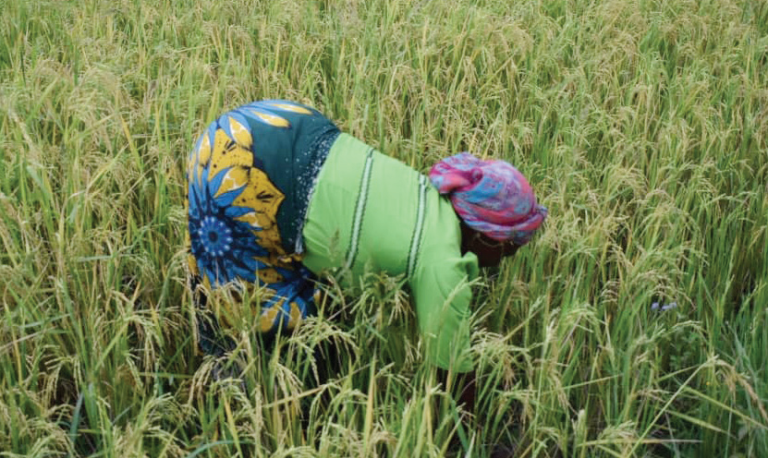When her husband died in 2014, Rosta Nyapeliwa instantly became a breadwinner for a family of seven.
The subsistent farmer, from Mkwinda Village in Machinga, had to do piecework to feed her six children.
Nyapeliwa uproots weeds from her rice paddy in Machinga
“Life became tough,” she recalls. “The earnings from piecework were too little to give us two meals a day and meet the children’s basic needs.”
The family that once depended on the deceased for everything slid into poverty as slavish casual work took its toll on Nyapeliwa.
Besides, crop yields kept falling as rains became unpredictable.
“We used to toil in vain,” she says. “We were harvesting so little that we struggled with perennial hunger amid recurring drought, dry spells and floods.”
World Food Programme reports that about 90 percent of Malawian smallholder farmers depend on rain-fed agriculture, but their productivity is constrained by high deforestation rates, rapid population growth and over-reliance on rains that increase vulnerability to climatic change.
Tackling hunger
To avert hunger and poverty, in 2008 farmers in the rural locality under Traditional Authority (T/A) Mposa started harnessing Lingoni River to irrigate their crops in the 50-hectare Phandiro Irrigation Scheme.
“Erratic rainfall pattern marked with drought, dry spells, floods and other effects of climate change have made it difficult to grow crops over the past decades,” says scheme president Nelson Kampando.
Nyapeliwa is familiar with the decried loss and damage. In 2015 and 2019, her crops were destroyed by severe flooding that came in quick succession with dry spells that scorched the crops.
“The river could dry up or flood our plots,” she laments.
Expansion
Nyapeliwa’s family is among 129 women-headed households harnessing irrigation farming to beat hunger and poverty.
The Ministry of Water and Sanitation rehabilitated the scheme’s weir, canals and access roads as part of Malawi Drought Recovery and Resilience Project (MDRRP).
The project funded by the World Bank came in 2017 to 2018, expanding the scheme from 50 to 80 hectares. The 255 farming families around the scheme now produce 320 metric tonnes of rice, up from 250.
Nyapeliwa says growing rice during the rainy season and dry months is strengthening their resilience to climate change.
“I grow rice twice and maize thrice a year. I sell the rice to buy basic needs and vital assets while the maize is for food. We are now food-secure and my children do not lack basics,” she states.
The farmer, who makes over K1.5 million from rice sales, encourages other women to join in for improved livelihoods and income.
Women benefit
Christina Maluwa, 50, says irrigation has been made simple.
“I joined my husband to lift ourselves from poverty and increase our household income. My rice plots generate over K1 million every growing season,” she brags
Maluwa says participation in the farm business has given her a say on economic decisions made in the family.
The family has since replaced a leaky grass-thatched house with a red-brick house with iron sheets.
Mavuto Kampanje, assistant irrigation engineer at Machinga District Council, says the rehabilitated scheme is improving livelihoods in surrounding communities and beyond.
“By solving the challenges faced by irrigation farmers, the project allows them to sustainably grow crops to deal with hunger and poverty,” he says.
Francis Wadi, principal irrigation engineer in the Ministry of Agriculture’s Department of Irrigation, says government is committed to help farmers enhance their productivity through irrigation farming.
“We are delighted the intervention has built their resilience, increased farmland and the farming is becoming the communities’ sustainable lifeline,” he says. n
NEXT: How are rural farmers benefitting from one of government’s flagship projects to irrigate 220 000 hectares by 2035?
The post Irrigation liberates women appeared first on The Nation Online.
 Moni Malawi
Moni Malawi 

